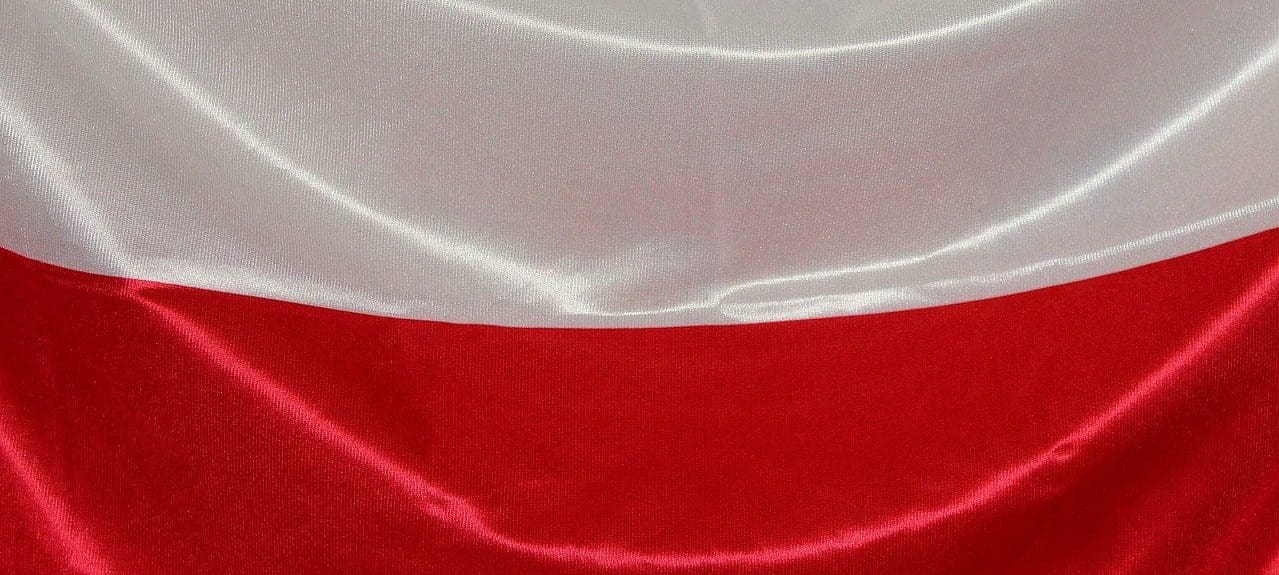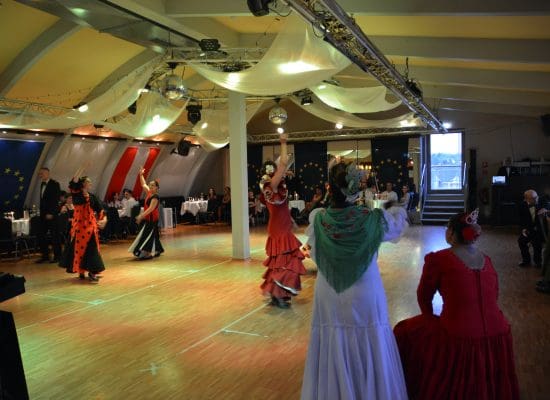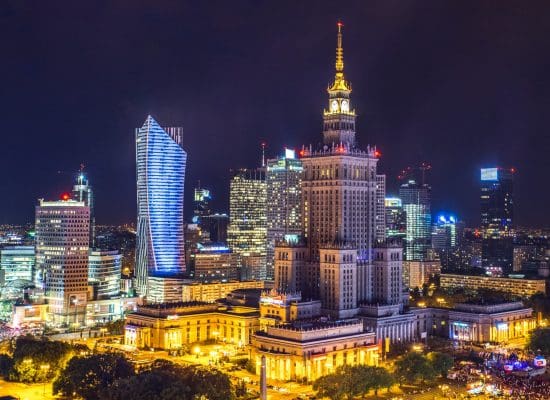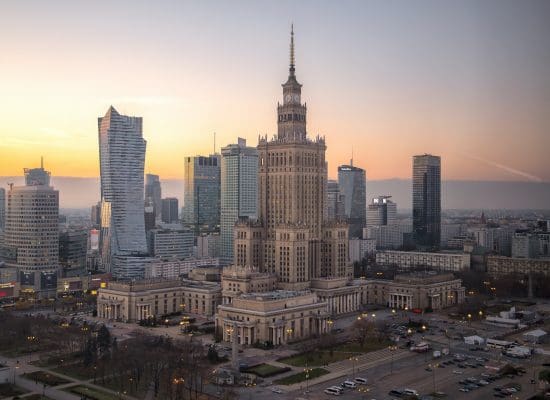Feature photo: Polish flag
Here is my post about the Rule of law problems in Poland and Hungary - once again; I'm afraid it won't be the last post on this topic.
A lot has happened, especially in Poland, since the draft was completed. I was able to incorporate the government's swing at the controversial Disciplinary Chamber; one of the core elements of the Polish judicial reform.
I didn't include the breakup of the governing coalition in Warsaw. The PiS is still in power. What will happen now remains to be seen.
I also no longer included that Trump admirer Tucker Carlson from the ultra-conservative US television station Fox News recently produced its program “Tucker Carlson Tonight” in Budapest and was doing it Viktor Orban allowed to speak in detail.
In doing so, Carlson supports Orban's plans to develop something of an ideological center for the global conservative movement in Hungary. Also the name of the Trump adviser Stephen bannon is mentioned. The New York Times reported extensively on this under the headline “Conservative Fellow Travellers: Tucker Carlson Drops In On Viktor Orban“ (nytimes.com, 7.8.2021/XNUMX/XNUMX).
Fingering the EU - About the emotionally charged politics in Poland and Hungary
Anyone who wants to get really annoyed with some EU member states, which only like Brussels because money is distributed there and otherwise because of everything else that defines the European Union - the European values of freedom, solidarity, justice, tolerance and the rule of law - thumbing your nose, I recommend a comprehensive report that was published in the New York Times on November 3.11.2019, XNUMX: "The Money Farmers: How Oligarchs and Populists Milk the EU for Millions" - "Die Geld-Bauern : How oligarchs and populists milk millions at the EU.”
The report, for which three journalists are responsible and for which five colleagues from London, Prague, Brussels, Budapest and Sofia have worked, paints a picture of the distribution and use of EU agricultural subsidies in Eastern Europe that could not be worse. In Hungary, the system promotes nepotism, self-service corruption and ultimately undermines the EU's climate goals. From the Fejer region, from the Viktor Orban The New York Times reporters report on a system of patronage that enriches Orban's friends and family, protects his political interests and punishes his opponents.
The introduction to the report, which takes place in the town of Csakvar, does not bode well: “Under communism, farmers worked in the fields surrounding the town west of Budapest, harvesting wheat and corn for the government that stole their land. Today, their children struggle for new employers who have appropriated the country through opaque deals with the Hungarian government. They have developed a new type of feudal system in which those who comply are given a job and the rebels are punished. These land barons, it turns out, are funded and encouraged by the European Union.” The NYT investigations are from 2019. Whether and what has since changed as a result of EU controls is not to be examined further here. However, I conclude that Hungary and Poland are not particularly interested in refuting allegations of corruption from the fact that both countries do not participate in the European Public Prosecutor's Office, which has been fighting bribery, embezzlement and fraud with EU funds since June of this year. The EU rule of law report 2021, which will be discussed later, states, among other things: "The government of Hungary cannot be a reliable administrator of EU funds as long as the problems have not been eliminated" (sueddeutsche.de, 20.7.21: " EU Commission gives Poland an ultimatum"). The description given by the Hungarian prime minister at the time seems to me to still apply Viktor Orban: "As an icon of the extreme right in Europe and a harsh critic of the European elites, Orban is happy to receive EU funds."
Elsewhere in the report – and this is to get to the heart of this narrative – the absurdity is pointed out that the same undemocratic forces that threaten the EU from within are benefiting from the funds from the agriculture program designed to build Europe. We have a problem in the EU today that has partly gotten worse because those responsible in the Council, the Commission and Parliament have not responded in a timely and clear manner to the activities of the populists who are thumbing their noses at the EU. Meanwhile, the autocrats in Hungary and Poland have become role models for politicians in other Eastern European EU member states.
An essence of the European Union — Article 2 TEU
The values on which the Union is founded are respect for human dignity, freedom, democracy, equality, the rule of law and respect for human rights, including the rights of persons belonging to minorities. These values are common to all Member States in a society characterized by pluralism, non-discrimination, tolerance, justice, solidarity and equality between women and men.
The EU Rule of Law Report 2021 – The Usual Suspects…
On July 20.7.21th, 2021, the EU Commission presented the Rule of Law Report XNUMX and - as the Süddeutsche Zeitung reports - "issued a devastating testimony to the governments in Poland and Hungary." remove union. "Democracy, the rule of law and fundamental rights are the basis of everything that makes up the European Union," said the Commission Vice-President Vera Jourová when presenting the report. The Justice Commissioner Didier Reynders stated that the "systematic" dismantling of the rule of law in Poland and Hungary is being copied. In addition, he sees a danger for the cohesion of the EU: "The primacy of European law is not negotiable, Europe à la carte cannot work." Therefore, the infringement proceedings against Germany because of the ECB judgment of the Federal Constitutional Court were unavoidable. (Quotes from sueddeutsche.de, 20.7.2021: "EU Commission gives Poland an ultimatum").
In the summary of the country section for Poland -- the English text is published on the Internet -- the reform of the judiciary in Poland, which has been ongoing for a long time, is again criticized. The ECJ has repeatedly declared individual parts of the reform to be incompatible with EU law. On 15.7.2021 July 2018, the ARD Tagesschau reported on another ECJ judgment in which the 2019 newly created disciplinary chamber as the supervisory body over all Polish judges is described as a violation of EU law. In contrast, the EU Commission initiated infringement proceedings against Poland in October 20.7.2021. However, this was unsuccessful; the Disciplinary Chamber continued to work. The Polish Constitutional Court had even - contrary to the ECJ ruling - decided that this did not have to be followed. On July 16.8.2021th, 20.7.2021, the EU Commission presented the Polish government with an ultimatum: if it does not declare by August XNUMXth, XNUMX that it will “fully” implement the judgments of the ECJ on the Disciplinary Chamber, (the Commission) will apply to the ECJ, from Poland to demand daily fines (sueddeutsche.de, XNUMX: "EU Commission gives Poland an ultimatum"). The ARD Tagesschau report raises the question of how independent the courts in Poland still are.
But Poland (and Hungary in other matters) apparently act according to the maxim: attack is the best form of defence. Malice, blackmail, political attacks, double standards - these are the comments of Hungarian and Polish government politicians on the rule of law report 2021. In Warsaw, they apparently intend to go one step further in the dispute over judicial reform: the government has a decision on this at the Polish constitutional court requests whether the Polish constitution takes precedence over EU law. The hearing is scheduled to take place in August.
Deutsche Welle assesses the situation as follows: "According to the reading of the government, the Polish Constitutional Court and most recently also the chairperson of the Supreme Court, Malgorata Manjowska, European judgments that intervene in the Polish judicial system violate the country’s constitution and are therefore ineffective” (dw.com, 21.7.2021: Poland/Hungary: “Political attack and blackmail”). On tagesschau.de, the situation is assessed as follows: "Should the Warsaw court stick to its previous line, critics of the right-wing nationalist government fear a step towards Polexit -- i.e. Poland's exit from the EU." Convinced Europeans see the old in such a discussion European problem: The EU, procrastinating on a lot of problems, is -- once again -- dealing with itself.
But suddenly there was a surprising turnaround: On August 7.8.2021th, XNUMX, Poland partially gave in. Vice Premier Jaroslaw Kaczynski, the strongman behind the Polish government, told a news outlet that the controversial disciplinary body was being dissolved. What will become of the other parts of the Polish judicial reform objected to by the ECJ is open (sueddeutsche.de, August 7.8.2021th, XNUMX: "Poland wants to abolish controversial disciplinary chamber"). The controversy over the severely damaged rule of law in Poland is by no means over, because the Commission's ultimatum referred to all ECJ judgments.
And Hungary?
What is going on with the other EU member that received a bad report in the 2021 rule of law report? If Hungary weren't already a member of the European Union, it would currently have no chance in the accession process. The Hungarian problem areas are described in the country section of the EU report: lack of judicial independence; the competences of the Council for Justice must be expanded. There is still a danger of nepotism at the upper administrative levels; there are still risks from existing connections between business and politics. “Media pluralism is still at risk. There are concerns about the independence and effectiveness of the media regulator.” The recent decision to revoke the broadcasting license of the independent broadcaster “Klubradio” is mentioned. What the Hungarian government is doing to civil society is downright outrageous, since an active and diverse civil society is the lifeblood of society. "Pressure remains on civil society organizations that criticize the government." Pro-government alignment of civil society, pro-government media channeling of public opinion... for all of this is likely Viktor Orban received the applause from Moscow and Beijing, because it gives the autocrats there the reasons for their weary smile when, for example, the EU in China protests against the 'restriction of civil liberties and the suppression of the opposition in Hong Kong. With their policies, Hungary and Poland are jeopardizing the credibility of the EU.
Orban and his advisors and supporters also rely on attack as the best form of defence. The Minister of Justice Judit varga described the rule of law report as “biased, politically motivated and factually lacking in quality.” The report was an “unconditional reproduction of opinions of negatively oriented non-governmental organizations towards our homeland” and a “means of blackmailing Hungary” (quoted from dw.com, July 21.7.2021, XNUMX : Poland/Hungary: "Political attack and blackmail").
The Minister of Justice used a metaphor whose deeper meaning is easily overlooked. Their importance for contemporary Hungarian politics becomes clear when one considers similar statements by leading Hungarian politicians. Judit varga spoke of NGOs with negative attitudes towards “our homeland”; that is to say, "our homeland" must be protected and defended against such attitudes -- also in relation to Brussels, which reflects the opinions of these groups "unreservedly". However, no critical statements about “our homeland” are currently accepted in Hungary; therefore, the government in Budapest argues, critical, “negatively minded” NGOs must be put under pressure.
Right-wing extremist populism – a digression on an emotionally charged politics
On December 15.12.2020, XNUMX, the Hungarian parliament approved a constitutional amendment with the votes of the government majority, which further restricts the rights of sexual minorities. “The father is a man, the mother is a woman” is stipulated, among other things. The adoption of a child by same-sex couples will thus be excluded in the future. A child's gender is determined at birth and cannot be changed later. In schools and kindergartens, learning content that is non-denominational or portrays sexual minorities in a positive way is threatened with punishment. In other words: in the future there will be no more Hungarian newspapers reporting on how two lesbian women lovingly care for the children they have brought with them.
The Süddeutsche Zeitung report on the constitutional amendment quotes a sentence that clarifies the model behind these rigorous state interventions in people’s privacy: “Hungary protects children’s right to their gender identity at birth and guarantees an upbringing according to the value system on which the constitutional identity and Christian culture of Hungary is based" (sueddeutsche.de, 16.12.2020: "Hungary prohibits homosexual adoption"). The ECJ is likely to deal with this constitutional amendment in the foreseeable future if those affected invoke Art. 21 of the Charter of Fundamental Rights of the European Union and complain about the restriction of their rights.
Charter of Fundamental Rights of the European Union - Article 21 Non-discrimination
(1) Discrimination based in particular on sex, race, skin color, ethnic or social origin, genetic characteristics, language, religion or ideology, political or other opinions, membership of a national minority, property, birth, disability, age or sexual orientation are prohibited.
(2) …
Further statements on Orban's ideas about a new Hungary can be found on Wikipedia; keyword Viktor Orban (born 1943); As of 27.7.2021/XNUMX/XNUMX.
It describes, among other things, Orban's rise in politics, before the fall of communism, beginning with the presidency of the Communist Youth League in Hungary. He was then a member of the leadership team of what was originally considered liberal today's governing party Fidesz; from 1992 to 2000 one of the vice-presidents of the Liberal International and from 2002 one of the vice-presidents of the European People's Party (EPP), to which the CDU and CSU also belong. And finally an icon of European nationalists and right-wing extremists. In previous years, Orban was a frequent guest at the CSU parliamentary group retreats in Wildbad-Kreuth and Seeon. After Fidesz left the EPP group in the European Parliament, such invitations should no longer be made in the future.
"The new state that we want to build in Hungary is not a liberal state, but an illiberal one," said Orban in 2014. Unlike in liberal democracy, freedom "is allowed to do everything that the freedom of others cannot restricts”, is not the central element of this state organization. As a goal of the new state, this can only mean that the civil liberties are at stake even if the rights of others are not affected -- the civil liberties can be restricted for reasons of state and for ideological reasons.
The new constitution that came into force on January 1.1.2012, 2020 (which was amended in XNUMX) includes the following principles: The reference to God, the Hungarian crown (Stephan's crown) and the concepts of fatherland, Christianity, family, trust, faith, love and national pride . An example given on Wikipedia shows how these principles were cast in concrete law:
In 2012, the Orban government enacted the Hungarian Church Law, requiring religious communities to be recognized by parliament. The ECJ ruled in 2014 that the law violated the European Convention on Human Rights and freedom of religion and assembly, since the state was abandoning its neutral position. The government had stated that it wanted to take action against the "proliferation" of religions and the improper acquisition of state funds.
The Hungarian government's relentless refugee and asylum policy is well known. Said in July 2018 Viktor Orban “There is a population change going on in Europe. Partly so that speculators like Soros himself can make big money. They want to destroy Europe because they expect big profits from it. On the other hand, they also have ideological motives. They believe in a multicultural Europe, they don't like Christian Europe, they don't like Europe's Christian traditions, and they don't like Christians.” This makes it clear: Orban feels called upon to defend the Christian Occident against refugees, against strangers. But on whose behalf is he doing this? That is why what he said about Islam in May 2015 sounds contradictory: “We do not share the point of view of the European right-wing extremists. They are against Islam. We don't at all. We are against immigration. There are countries that have taken this risk. We have not accepted it and we do not intend to do so in the future either. We respect that France or Germany went a different way, but we have the right to have ours respected too. We don't want a multicultural society.” The usual “yes-but-statements” of the populists. He could have said all of this more briefly: Muslims are great, but not when they come to Hungary.
If one compares the European catalog of values of Art. 2 TEU with the principles of the Hungarian constitution laid down in the introductory national commitment, the different language and terminology is striking. Art. 2 TEU contains all the terms that are usually found in constitutional texts: human dignity, freedom, democracy, the rule of law and others. Some of the Hungarian principles move on a completely different conceptual level: Loyalty, faith, love and national pride are difficult to define legally, because everyone has different ideas about the content.
The first creed in the Hungarian constitution of April 25.4.2011, 1000 reads: “We are proud that our king, Saint Stephen I, built the Hungarian state on solid foundations a thousand years ago and made our homeland a part of Christian Europe. Stephen I was undoubtedly a great figure in Hungarian history. From 1038 - 2 he was the first king of the Kingdom of Hungary. He is the national saint of the country; the Crown of St. Stephen crowns what is now Hungary's national coat of arms. Historians may discuss the line of connection to Christian Europe. Constitutional patriots can do a lot with the terminology of Art. XNUMX TEU, but little with some of the Hungarian principles.
The Hungarian government confidently declares that it wants to defend the culture and traditions of the country (and also of the Christian West). But who decides what this actually means? Who and what is part of this culture and traditions and who or what is not? And what happens when culture and traditions evolve and change, as in any living society? What if time passes beyond the current terms? And undoubtedly the experience is not new: culture and traditions can be absorbed and emotionally charged and woe betide when loyalty, faith, love and national pride are used against "the others", against those who are not supposed to belong.
The French and Americans also love heartwarming patriotism. However, they did not write their love for the fatherland and their reverence for the flag in the constitution, where above all the fundamentals of the country and the law are enshrined, but rather in their national anthems, in the Marseillaise and in the “Star-Spangled Banner, which they sing with dignified fervor on many occasions
The terms in the introductory commitment to the Hungarian constitution are difficult to grasp because they do not come from legal language. Similar to the Treaty on European Union (EUV), the German Basic Law does not contain such terms that appeal to the heart. The fact that they were introduced into the Hungarian constitution, which came into force in 2012, shows that politicians there want to consciously and linguistically distance themselves from the norms of the European Union. It will as long as Viktor Orban and his party Fidesz rule there, there are always disputes about the law and the rule of law. In the interests of its credibility, the EU must not avoid these disputes.
Subchapters: Do people tick differently in Eastern Europe?
When Hungary and Poland joined the European Union in 2004, they had met all the requirements. In the referendum in Hungary, with a participation of 45,6 percent of those entitled to vote, 83,6 percent voted in favor of accession. In Poland, 58,8 percent took part in the vote; 77,4 percent voted in favor of joining the EU (source: Wikipedia). Both countries had contributed significantly to the disintegration and eventual end of the Soviet-style communist system. In Hungary, the Iron Curtain became permeable for the first time and the other satellites were no longer able to close the gaps. In Poland, the Solidarnosz trade union has withstood intense pressure from those in power. Solidarnosz still exists today, but the union is now deeply linked to the nationalist ruling party PiS.
Lech Walesa, who led the strike in Gdańsk that contributed significantly to the collapse of the system, said of today's Solidarnosz trade union: “It is completely different than it was then, it should not be allowed to use the same name anymore. Nothing connects me with today's Solidarnosz. We have completely different goals and interests." A New York Times report notes that -- instead of standing up for freedom -- Solidarity today operates actively alongside the government against gay men, lesbians and anyone else who still has their freedom Do not pay enough respect to the opinion of the Polish nation and its traditions.
From Jaroslaw Kaczynski, the strong man in present-day Poland and his twin brother Lech Kaczynski, who died in a plane crash in 2010, doesn't think much of Walesa: "They were minor activists," the New York Times quotes him as saying. Jaroslaw Kaczynski was not even arrested after the communists declared martial law in 1981. The dislike is mutual. The ruling party PiS describes Walesa as a traitor because he negotiated the peaceful transfer of power with the communists in 1989 (information and quotes from nytimes.com, 28.7.2021: "Poles Tussle Over an Icon of Their Past, With an Eye on the Future") .
But isn't it paradoxical and almost absurd that Poland and Hungary, of all people, who overthrew the communist dictatorship, later brought nationalist and autocratic politicians to power? Although these are happy to receive grants from the EU, they do not think much of the state and socio-political foundations, the essence of the EU. The reasons and background of this reversal cannot be presented here in detail. Not only in Poland and Hungary but also elsewhere in Eastern Europe and also in the former GDR there were expectations, hopes and dreams that did not come true. After 1989 there was a time of talking past each other, of internal injuries and frustrations that "Ossis" and "Wessis" inflicted on each other. While there has been rapid change, it has often not been what people expected.
In the post-reunification years, I was relatively often in Heilbronn's twin town of Frankfurt (Oder). A ritual has developed: every time I visit the café on the top floor of the Oderturm and watch the city change. Vacant lots closed, the buildings and roofs became more colourful, urban development was in full swing and radiated life. But I knew from the encounters and conversations that people lived down there -- probably many people -- who looked to the future with mixed feelings. We agreed in the conversation that the material upheavals in the former GDR were easier to cope with than in Poland, the Czech Republic, Romania, Bulgaria or Hungary due to the inflow of money from the Federal Republic. The personal ruptures and disappointments ran much deeper there than in the new federal states.
At the same time, an economic upheaval was taking place in the West, which had a significant impact on developments in Eastern Europe. Ronald Reagan in the US and Margaret Thatcher in Great Britain proclaimed a new creed that the state was not the solution but the problem. “The market” was supposed to fix it, you just had to let it work indefinitely. With the collapse of the US bank Lehman Brothers in 2008 and the resulting financial and economic crisis, this credo was badly damaged. All of this caught the people of Eastern Europe completely unprepared and they were deeply disappointed with what “the market” had done to them. The post-reunification years were not only the heyday of economic expansion, but also the heyday of populists and proclaimers of simple solutions -- their time is not over yet.
In the west it was and is still being discussed whether and why people in Eastern Europe tick differently? The historian Ilko Sascha Kowalczuk In Chapter 5 of his book "The Takeover - How East Germany Became Part of the Federal Republic" (Verlag CH Beck, 2019), he examines the question "Who are East Germans?" “ –- indicates in which direction he will argue:
"East Germans are ... not only diverse and often contrastingly shaped by the experiences up to 1989 or the revolution. The events, experiences and living conditions since then have been just as decisive.” This general statement can certainly also be applied to “the Eastern Europeans”. People not only brought their imprints with them from the times before reunification - we, the "Wessis", the Western Europeans, also helped to shape the imprints afterwards. In the final chapter of Kowalczuk's book, this co-shaping and thus the co-responsibility of the West for developments in East Germany -- and certainly also in Eastern Europe -- is worked out. Two quotes from the section “East Germany as a laboratory of globalization”:
It refers to statements that Ralph Dahrendorf more than twenty years ago with a view to globalization. Globalization and its social consequences “encourage authoritarian rather than democratic constitutions.” These “but can last; they are neither as catastrophic nor as precarious as totalitarian dictatorships. A century of authoritarianism is by no means the most unlikely prognosis for the 21st century.”
Right-wing populism was able to get off to a very different start (than left-wing populism) on the basis of national and ethnic principles. Because the right-wing populists deliberately built on the unresolved traditions of nationalism, anti-Semitism and racism in Germany and Europe. They picked up the East Germans "where they stopped".
Kowalczuk established this primarily with a view to East Germany; but the promotion of right-wing populism as a result of globalization probably applied equally or similarly to the other Eastern European states. People were shaped differently by their experiences before and after reunification.
Do these scientific descriptions of the causes of right-wing populism absolve the people of Eastern Europe of responsibility for these meanwhile dangerous developments? Probably not quite. That voters in Poland Jaroslaw Kaczynski and in Hungary Viktor Orban elected to power cannot be blamed unreservedly. The Americans have Donald Trump elected its president, with all the consequences and dangers that became sufficiently clear after four years. However, the responsibility of responsible citizens is called for at the latest when it comes to assessing the performance of the newly elected rulers. The Americans have again taken power from Trump. It is unclear what will happen in the next elections in Poland and Hungary. What the EU can do with its legal and other possibilities is still to be discussed. But also about what civil society and the media -- if they are not brought into line -- can and must do to make the electorate in Eastern Europe think.
What to do?
Since the clashes in summer and autumn 2020, when Hungary and Poland made moves to block the entry into force of the EU reconstruction program "Next Generation EU", there has been increased reporting in the press and on television about the extent to which some EU member states -- contrary of the commitments made upon joining the EU -- drifting into autocratic structures. The two countries governed by right-wing nationalism, Poland and Hungary, are particularly at risk. With their blockade, they tried to overturn the EU rule of law mechanism.
After much wrangling, a compromise was negotiated under the leadership of the German Council Presidency and the original rule of law mechanism was supplemented by several additional declarations. In my view, it is an open question how these additions will actually affect a future dispute. Among other things, the EU promised in one of the declarations that it would not interfere with the "national identity" of the member states. But how is this “national identity” defined in the case at hand? First and foremost, Hungary and Poland gained time because the compromise stipulates, among other things, that the ECJ should await an assessment of the rule of law mechanism. It is therefore likely to be a long time before a funding cut is actually implemented on the basis of the rule of law mechanism. (For details on the compromise, see Frankfurter Rundschau – fr.de, December 4.12.2020th, XNUMX: “EU Corona aid package: Hungary and Poland agree to compromise – funds can flow”).
can himself Viktor Orban feel like a winner after this compromise? Maybe at home in Hungary at its base but certainly not at the European level. Here he has absolutely cemented his reputation as a troublemaker and obstructionist. In doing so, he did his country's reputation a disservice in the long run. Orban's shadow falls on visitors from Hungary in other EU countries.
It may take longer, but steady dripping wears the stone and some Fidesz voters will see the contradictions in the Hungarian prime minister's statements. At tagesschau.de, this is summarized in two short sentences: "Orban maintains the horrific image of a Brussels super-state that is to be imposed on Hungary. The country is one of the European states that particularly benefit from EU money” (tagesschau.de, 7.7.2021/XNUMX/XNUMX: “The check handover has to wait”). However, it is to be feared that Viktor Orban and some politicians from the Polish PiS will no longer become European democrats. The balance within the European Union will only shift again when the right-wing populists are voted out by their compatriots. However, this must not mean that the fight for the rule of law and for European values can rest until then. There are a number of legal and other approaches.
According to Article 17 TEU, the Commission monitors the application of Union law under the scrutiny of the Court of Justice of the European Union. She is the guardian of the treaties and above all of the European values according to Article 2 TEU. In view of the years of disputes with Poland over the country's judicial reform, this is not a rewarding task. Poland simply ignored a number of ECJ rulings. But sometimes, it seems, signs and wonders still happen. Shared on 7.8.2021/XNUMX/XNUMX Jaroslw Kaczinski, the chairman of the governing party PiS with that Poland wanted the ECJ in mid-July d. J. to implement the judgment and abolish the controversial Disciplinary Body. This chamber, a key part of Poland's judicial reform, has the power to dismiss any judge or prosecutor. What will become of the other parts of the judicial reform, which the ECJ has branded as violating EU law, remains to be seen.
On the face of it, Article 7 TEU appears to offer great protection for the values listed in Article 2. According to Article 7, the European Council can determine that a member country violates the values seriously and persistently and for this country certain rights -- up to the right to vote in the Council -- suspend. But a closer look reveals that this possibility under Article 7(2) is actually a blunt sword. The determination of a sanction against a member country must be unanimous. Poland and Hungary, the priority aspirants, have already pledged to prevent either of them from being killed.
Protecting European values on the basis of the Lisbon Treaty is a long, drawn-out undertaking that may not yield much in the end. Nevertheless, the bodies charged with protecting values, above all Parliament, have to work patiently on this track. The EPP group in parliament can now also become clear after Orban's Fidesz party left there. Governments, which think highly of subsidies from Brussels but not very much of the values of the EU, must not give the impression that the EU can be beaten down.
It seems to me that effective protection against breaches of contract is via the European public sphere. It is therefore important that the media constantly report on what is happening, both good and bad, in the individual Member States. For example, farmers in Europe should know how Orban's Hungary found ways to use the money from Brussels to reward their "loyal". In the New York Times report of November 3.11.2019, XNUMX cited above Joseph Angyan, a former collaborator in the Orban government quotes: "It is an absolutely corrupt system." among the richest people in the country. "Those who control the country get millions from the EU" (nytimes 3.11.2019/XNUMX/XNUMX: "The Money Farmers: How Oligarchs and Populists Milk the EU for Millions").
With regard to the EU rule of law report 2021, which has also already been cited, the headline in the Heilbronn voice of 21.7.2021 -- printed under a photo of Viktor Orban -- reads "A devastating balance sheet". The law passed in the Hungarian Parliament on 15.6.2021 June 15.6.2021 with the votes of the Fidesz party and the right-wing Jobbik party, which is said to protect children and young people but in reality the rights of homosexuals and transgender youth restricted. A headline in the Süddeutsche Zeitung reads: "Hungary's parliament votes for LGBTQ-hostile law" (sueddeutsche.de, XNUMX). Another headline quotes the statement by the President of the Commission Ursula von der Leyen: “This Hungarian law is a disgrace” (sueddeutsche.de, 23.6.2021/24.7.2021/XNUMX). The New York Times headlined: "In Hungary, an Embattled LGBTQ Community Takes to the Streets" (nytimes.com, XNUMX/XNUMX/XNUMX). Apparently Orban has speculated with this law and stabbed in a hornet's nest. He will now consider whether he will actually let the Hungarians vote on this law in a referendum, as announced. A state-led election campaign against a minority may make him appear a "hero" to his base, but such an action will further damage Hungary's reputation in Europe and beyond. Annotated in the Süddeutsche Zeitung Matthew Kolb with a view to the reactions in the European Council: "Finally we are talking plainly" (sueddeutsche.de, 25.6.2021).
All these headlines and reports may not have any effect on the legal level. But they are necessary and important. They won't have an immediate impact in Hungary, where much of the media is conformed or controlled, but well-informed Europeans outside of Hungary will ask visitors from there -- and from Poland too -- critical questions: what's going on in your countries ? Why are you dancing on our noses and still taking the money from Brussels that others pay there? And some from Hungary and Poland will return home with these critical questions in their ears: What's going on in our country? Even autocrats don't rule forever. The next parliamentary elections in Hungary will take place in 2022 and in Poland in 2023.







